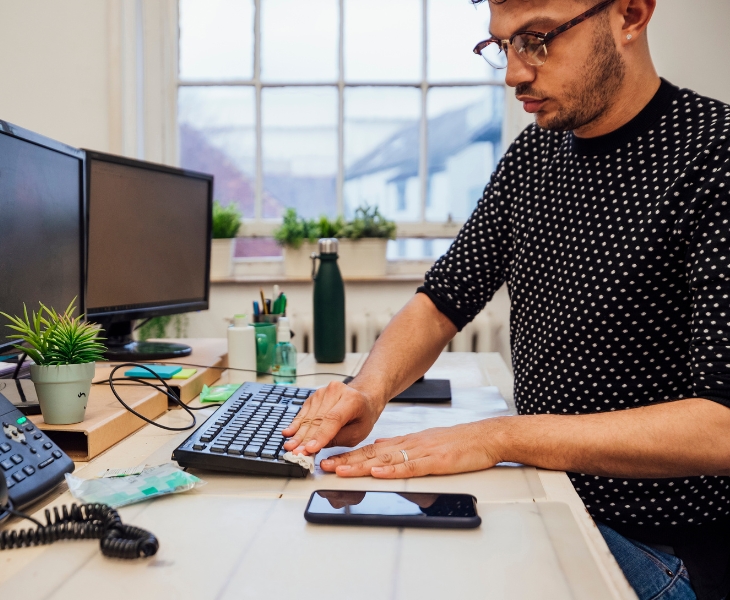The average office desk has more than 10 million bacteria living on it, which is 400 times more than what is found on a toilet seat, according to research from the National Library of Medicine, with refrigerator doors, computer keyboards, and printers among the worst offenders. An unclean and untidy work environment can be dangerous and disruptive, making you less productive and at risk of illness.
A clean work environment boosts productivity, efficiency, focus, and morale and the best time to clean is at the end of each day, leaving your mind fresh for the next day. Most likely, if your office is cleaned by professionals, they won’t clean your workstation more frequently than once per week. Time restrictions may also prevent a thorough clean. It’s better to take a few minutes before starting your day to clean or sanitise to ensure you are working in a clean and healthy
environment.
Sanitising Desks Regularly
Even if your desk looks clean; dust, food crumbs, and invisible bacteria can thrive on high-touch surfaces quickly. Using a damp cloth or antibacterial wipes to wipe down your desk, shelf-tops, inside of desk drawers, and filing cabinets can help keep the area neat and clean. If you want the surface to be disinfected, use a water-based cleaning solution with a disinfectant cleaning agent or cleaning vinegar to wipe down non-electronic surfaces of your workstation. Regular cleaning and sanitising of a hard surface minimises the number of germs and lowers the risk of cross-contamination.
Cleaning your Monitor
To remove dirt and germs from the screen, use a dry, soft, lint-free cloth. Spray 70% isopropyl alcohol on a cloth or use a single-use alcohol wipe to wipe down the screen to remove fingerprints or dust. Consider using products that are free of acetone, ammonia, and alcohol, as glass cleaners can easily harm LCD screens. Before using any cleaning product other than a soft, dry cloth, it is best to always read the manufacturer’s instructions.
Clean your Keyboard
Most likely the dirtiest item on your desk is the keyboard. The average keyboard has twice as many bacteria (3.5 million) per square inch as a phone (1.6 million). Regular keyboard cleaning can prevent you from getting sick, contracting a disease, and missing work days. If you share your computer with co-workers, you should be especially careful to clean the keyboard before using it. Use a soft, lint-free cloth to remove dust and grime from the keyboard and a disinfectant wipe with a 70% isopropyl alcohol solution to clean it.
Less Clutter, Less Stress
The National Association of Professional Organisations reports that the average person spends 4.3 hours per week looking for paperwork, which not only reduces productivity but also lowers the quality of work and causes unwanted stress. Try to give every item a dedicated ‘home’. Keep items used a few times a day stored out of sight (i.e. cables, files, stationery). Keep confidential files and expensive items (like hard drives) locked in a cabinet. Bin items that you don’t need to keep (be strict about this!). This will make it much easier for you to keep your workspace tidy and free of distractions.

